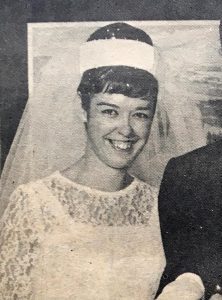
It seemed a wonderful coincidence. But it really wasn’t. Back in 1964, my father, Alex Barris, was admitted to Scarborough General Hospital for surgery to remove kidney stones. Then, for several days he remained in hospital recuperating.
One of the nurses attending him turned out to be a neighbour. Registered nurse Claudia Dee, whose family lived up the street from us in Agincourt, seemed assigned to attend Dad’s needs 24/7 – making sure that his pain was under control, that he got meals on time and that he got home as soon as possible.
“She was like a guardian angel,” I remember Dad saying.
As Dad continued to convalesce at home, RN Dee made a special point of stopping by the house to help with dressing changes and pain management. I’m sure that sense of commitment came in part from our being neighbours on the same street. But Claudia Dee had trained in Ontario’s public health system, served in it, and clearly believed in its principles – serving the greater good.
It’s my view that Doug Ford’s so-called “bold action to reduce wait times for surgeries (by) leveraging community surgical and diagnostic centres,” will not only threaten Ontario’s health-care system, it will also dilute or eliminate the ethos of health-care professionals to serve the public good.
The premier doesn’t like the status quo, but he’ll most likely ensure that many of Ontario’s 900 independent for-profit health facilities thrive.
The premier announced Monday that his plan will free up time and space for more complex care in Ontario’s hospitals. But critics – including doctors, nurses and the provincial opposition parties – believe that moving such procedures as eye, hip, knee surgeries as well as MRI and CT scanning to private clinics, will further debilitate Ontario hospital staffing.
“People will end up paying out of pocket and face longer wait times in our hospitals,” said NDP health critic France Gélinas, “as (Ford’s) plan drives health-care workers from our public system to for-profit facilities.”
About 20 years ago, a heart specialist recommended that I receive a pacemaker implant to improve delivery of oxygen to my blood system. I felt rather nervous about the whole process – from the pre-op tests to the trip into the operating room.
I don’t remember very much about the surgery, except for the nurse (en route to the OR) who chatted me up about my writing career and my interest in history; then she delivered the anesthetic. She’d distracted me completely from my worry about the procedure.
And when I awoke sometime later in a recovery area, she was the first person there to reassure me that all was well, and that I’d “quickly be back writing history with renewed vigor.” It occurred to me then how fortunate I was to have received such genuine care and concern.
In an interview with CBC Radio on Tuesday, Kevin Smith, the president and CEO of University Health Network in Toronto pointed out that Ontario’s health-delivery system has functioned with for-profit facilities since the early 1990s.
He noted, for example, that the Kensington Eye Institute has conducted low-risk procedures, such as cataract surgeries, safely and effectively. But he added that the big question mark about expanding private clinics is how will professional staff at public hospitals respond?
“All roads lead to staffing,” he told The Current. “There’s a fear that (private clinics and higher wages) will bleed hospital staff away from public to private facilities,” and create what some call a two-tiered system of care for Ontarians.
In the middle of 2008, when my mother Kay Barris lived out her final months at Bridgepoint Hospital in Toronto, my sister Kate and I wrote in a bedside diary about our mom’s activity, wishes and reflections.
The notebook became a daily registry of Kate’s and my observations, but on several occasions, we arrived to find Mom’s thoughts jotted down too.
“April 13. Tell Kate to bring me a back scratcher,” one entry read.
“July 18. Today is my anniversary. Married in New York … July 18, 1948.” And following a visit from our infant granddaughter, she wrote, “What a pleasure to hold your great-granddaughter in your arms. She can’t imagine how happy that made me. I have a lovely caring family. How lucky I’ve been.”
Mom must have shared some of these thoughts with nurses attending her, because when she was gone, one nurse noted, “Kay Barris was one cool chick.” They had truly connected with a kindred caring spirit and given her appropriate attention right to the end.
Whenever I’m in a hospital, the nurses I want attending me, my loved ones and my friends are those invested in our well-being, not those who might be spurred by our investment in their for-profit clinic owners.